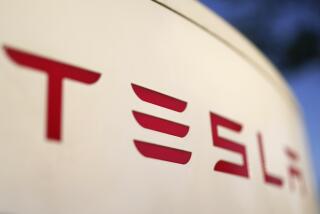Toyota may pay $1 billion to settle federal criminal investigation
Here’s how Toyota Motor Corp. plans to finally put the sudden-acceleration issue to rest: Pull out the checkbook.
The automaker is reportedly close to paying a $1-billion fine to settle a four-year federal criminal investigation into whether it properly reported safety complaints to regulators. Meanwhile, Toyota’s lawyers are in settlement talks over hundreds of civil lawsuits alleging wrongful deaths or injuries, potentially adding hundreds of millions to the tab.
Previously, Toyota agreed to pay $1.6 billion to settle a class-action case brought by thousands of Toyota owners who contended that sudden-acceleration problems damaged the value of their vehicles.
The automaker has repeatedly denied any serious safety defect that caused its cars to take off at high speeds, causing wrecks that killed or injured occupants. Toyota appeared ready for a protracted legal battle to fight hundreds of legal claims to the contrary.
Now, Toyota appears ready to pay what it takes to move the story off front pages and newscasts.
“Toyota is trying to put this entire episode behind it,” said John Goldberg, a Harvard Law School professor and product liability expert.
Investors and shareholders generally react positively to “closure,” even when that comes at a price, Goldberg said.
“Given that the allegations of at least some injury victims were credible, and given the attention of government regulators, Toyota wasn’t going to be able to resolve things without negotiating substantial settlements,” Goldberg said.
The potential for a $1-billion settlement of the criminal investigation was first reported by the Wall Street Journal. Citing unnamed sources, the newspaper reported that an agreement with the U.S. attorney’s office in New York could come within weeks. But the deal is not done and could change, according to the Journal.
Toyota confirmed the talks, issuing a statement that it “continues to cooperate with the U.S. attorney’s office in this matter. In the nearly four years since this inquiry began, we have made fundamental changes to become a more responsive and customer-focused organization, and we are committed to continued improvements.”
It is a strategy successfully pursued by other big companies. Merck’s reputation, for instance, has recovered from its 2007 multibillion-dollar settlement over problems with the painkiller Vioxx, Goldberg noted.
Moreover, Toyota has the money to spend.
Earlier this month, the Japanese car company said it was on track to earn a record profit of 1.9 trillion yen, or about $18.8 billion, for the fiscal year ending March 31. That’s more than the combined annual earnings of General Motors Co., Ford Motor Co. and Chrysler Group.
Automotive safety advocates welcomed news of a potentially huge fine in the criminal probe.
It is “enough to make even Toyota flinch,” said Clarence Ditlow, executive director of the Center for Auto Safety.
“Even today, no one knows what Toyota withheld from the National Highway Traffic Safety Administration that could have proven beyond a reasonable doubt that sudden acceleration is due to vehicle design, not driver error,” Ditlow said. “Only billion-dollar fines and criminal prosecutions can stop auto industry cover-ups of deadly vehicle defects.”
Ditlow said the threat of criminal penalties gave the U.S. attorney more leverage than NHTSA — the agency that regulates automotive safety — to make Toyota pay such a large fine.
Toyota has faced sudden-acceleration complaints since 2009, after a California Highway Patrol officer and his family were killed when a Lexus ES crashed outside San Diego. That crash is thought to have been caused by a floor mat jamming the gas pedal in the open position. But investigators said the car was too badly damaged to be sure.
In the months after that wreck, Toyota recalled millions of vehicles, and its top executives came from Japan to testify before several congressional committees investigating the problem.
The Japanese automaker has repeatedly denied that its vehicles have an electronic flaw that might cause them to accelerate unexpectedly. Toyota has blamed such incidents on three possible causes: drivers mistaking the gas pedal for the brake; gas pedals getting stuck under floor mats; or sticky gas pedals that don’t throttle back quickly as foot pressure eases.
A 10-month investigation, conducted primarily by NASA engineers, found no evidence that electronic defects or software code errors could have caused the thousands of sudden-acceleration incidents reported over the last decade. That review blamed the incidents on the same mechanical issues identified by Toyota.
Last year, however, an Oklahoma City jury found that faulty electronic systems caused a Camry sedan to suddenly accelerate and crash, killing one woman and injuring another.
The jury ordered Toyota to pay $1.5 million in compensatory damages to the driver of the vehicle, Jean Bookout, and an additional $1.5 million to the family of Barbara Schwarz, who was killed in the crash. The panel agreed with the plaintiffs that defective software in the 2005 Camry’s electronic throttle system caused the accident in September 2007.
Toyota has settled a number of sudden-acceleration lawsuits out of court, including a $10-million deal reached in 2010 with the heirs of the CHP officer killed in the Lexus crash.
Toyota also paid $25.5 million to settle shareholder claims that the company’s stock price was damaged by a failure to report safety issues. It paid more than $65 million in fines for violations of federal vehicle safety laws.
Toyota still faces a Securities and Exchange Commission investigation, according to a regulatory filing the automaker made last year.
Toyota’s new appeasement strategy could backfire, however. A $1-billion fine and a settlement with the Department of Justice could make it harder — and more expensive — for Toyota to negotiate settlements in civil lawsuits over sudden acceleration, said Carl Tobias, a law professor and product liability expert at the University of Richmond in Virginia.
It also gives more ammunition to any plaintiffs who choose to reject settlement offers and go to trial, Tobias said.
“Toyota will have to pay even more to extricate itself from the sudden-acceleration problems if it is to have any hope of putting the issues behind it,” he said.
Twitter/latimesjerry







